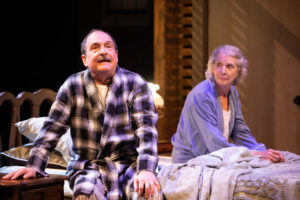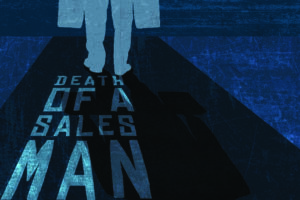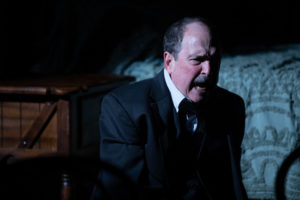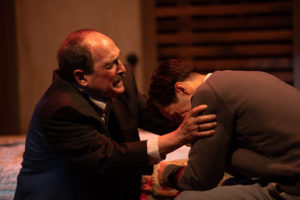By Patsy Isenberg
Arthur Miller’s 1949 Death of a Salesman opened Sept. 23 to a full house of enraptured theatergoers at Flint’s Repertory Theatre (The Rep). For this opening night of the new season, food and drinks were served before the play began and a champagne toast was offered afterward — perhaps to help salve the gloomy effect of the plot. The play runs through Oct. 9 and tickets can be purchased at tickets.thewhiting.com.
At the least, the play was powerfully delivered with expert directing by the Rep’s Artistic Director Michael Lluberes, and acted superbly by Lewis Stadlen as Willy Loman; Carolyn Gillespie as Willy Loman’s wife; Michael Lopetrone as Loman’s elder son Biff; and Kevin O’Callaghan as Happy, the younger son.

Michael Lopetrone as Loman’s elder son Biff (left); and Kevin O’Callaghan as Happy, the younger son (right). (Photo by Mike Naddeo/The Flint Rep)
What is the significance of Willy Loman’s troubled character that speaks so poignantly to us today, 73 years later?
It’s a play the viewer might want to look away from, in this era of despair and “quiet quitting.” Is it because it reminds us of a step toward society’s current state in which many of us feel futile?
Is it that Loman seemed to be headed into senility? The term “dementia” wasn’t common at that time and it’s not mentioned in the play. But the confusion Loman experiences is so well dramatized here and his many flashbacks and going off mentally from the conversations that are actually taking place indicate possible dementia. Or is it more? Is he tormented by the depression, by the meaningless of life, by the seeming uselessness of effort? Or was Loman’s inner life as portrayed in the play just a way for Miller to allow the audience or reader to get into his head and his past?

Lewis Stadler as Willy Loman (left) and Carolyn Gillespie as Willy Loman’s wife (right). (Photo by Mike Naddeo/The Flint Rep)
Certainly Death of a Salesman suggests more than simply the choice to show how difficult it is to work as a salesman, and Loman’s obsession to succeed at it, but eventually failing. Still, Arthur Miller avoided more symbolic interpretations. In a quote included in the Rep’s program, Miller wrote in the introduction to his “Collected Plays’” (Cresset Press, 1958) “Probably the most succinct reaction to the play was voiced by a man who, on leaving the theatre, said ‘I always said that New England territory was no damned good.’”
But you may need to see the play again to really get it what Willy Loman means to us in 2022.
Lluberes says directing the play has “been a tremendous joy to work on one of the greatest American plays of all time with this group of extraordinary artists. Arthur Miller’s timeless masterpiece is as relevant today as it ever was, and we’re so thrilled to share it with you.”
The play opened on Broadway in 1949 and continued for 742 performances. It won the Tony Award for best play, a Pulitzer Prize for Drama, and the New York Drama Critics’ Circle Award. The supposed “anti-American” tone in its plot prompted the House Committee on Un-American Activities to call upon Miller to testify.

Playbill cover for The Death of a Salesman. (Photo source: The Flint Rep)
Miller said in his testimony “I am not a fictionalist. I reflect what my heart tells me from the society around me. We are living at a time when there is great uncertainty in this country … I am devoted to what is going on. The hardest thing to do is to tell what is going on.”
This reviewer saw one of the many screen versions years ago and again tried watching the Dustin Hoffman portrayal of the main character, Willy Loman, again a few days before the Flint performance.
But I abandoned it halfway through due to easy distractions. Seeing it onstage is probably best. This is especially true at The Rep’s Elgood Theatre. The set and the actors are just a matter of feet from the audience. The sound is clearer, you see the actors’ shadows and movement of the costumes, and even hear their footsteps. No piece of dialogue is missed.
Despite the small footprint available at The Elgood, the set built for this production under the direction of Shane Cinal (Scenic Designer) worked exceptionally well.
The play moves through several scenes, but lighting and sound by Chelsie McPhilimy (Lighting Designer) and Matt Coggins (Sound Designer) allow for the quiet and quick rolling in pieces of furniture with hardly a break in the viewer’s attention. Stage Manager Melissa Nathan, was probably challenged with that action. Choosing to have the actors look in a different direction worked as a signal to the audience that the location has changed. The main set manages to show several different rooms in the Loman house and even the neighboring buildings in New York as a backdrop, suggesting where the characters live.
Main character, Willy Loman, is played by Lewis J. Stadlen whose resume includes many Broadway roles, Tony Award nominations, and award wins such as Drama Desk, Outer Critic Circle and Irish Times. He also has acted on screen in such works as The Verdict, To Be or Not To Be, In & Out and as Dr. Fried on The Sopranos. This was a challenging role that Stadlen says he always hoped to play. He inhabited the character extremely well.

Lewis Stadler played the main character, Will Loman in The Flint Rep’s The Death of a Salesman. (Photo by Mike Naddeo/The Flint Rep)
The three other primary roles were also cast well. They must have found this emotional drama extremely challenging.
Carolyn Gillespie as Willy’s wife Linda Loman has Flint connections. Gillespie is professor emerita of University of Michigan – Flint, having been on the theater faculty from 1987 to 2011. Her resume includes a nomination for a Michigan Distinguished Professor award in 2008. She has directed and acted in many plays over the years. In fact, as the program notes, 40 years ago Gillespie made her directorial debut with Death of a Salesman itself. Gillespie also holds an MFA in Acting from Stanford University.
Lopetrone, as Loman’s elder son Biff, is a familiar face at The Rep because he played Tom in The Rep’s The Glass Menagerie in April of 2019 and Randle P. McMurphy in One Flew Over the Cuckoo’s Nest in March of 2020. Both were major characters in the plays.
Happy, the younger son, was played by award-winning actor director, teacher and producer Kevin O’Callaghan. Currently O’Callaghan is teaching acting at Lansing Community College, but he’s worked and studied in many other parts of the country.
Another very familiar face in this production is Rico Bruce Wade as Uncle Ben. This character appears to Loman often in the play and looks striking in a white suit (one of the many fine costumes created by Costume Designer Brandon R. McWilliams) as though in a dream, offering Loman advice; after all, the Uncle Ben character had died many years prior. Wade has been in many Rep productions including The Boatman, Into the Woods, One Flew Over the Cuckoo’s Nest, and his most recently in Happy Days. Rico’s film work includes Sincerely, Brenda, FOUR-NINETY, and Songs for My Right Side. He’s also an instructor at Wayne State University and a teaching artist with several theatrical teaching organizations.
Detroiter Craig Ester has two roles in the play. A graduate of Class Technical High School, Ester plays Howard Wagner (Loman’s boss) and Stanley (the waiter). In high school he studied with Tony-award-winning Marilyn McCormick. Ester has a BFA from the Acting Program at Ball State University and the Mosaic Youth Theater of Detroit’s Acting Company. He’s had numerous roles prior to this current one mostly, but not all, in Shakespeare works. Ester is also Founder and Artistic Director of Break the Chain Theatre Company. This is his Flint Rep debut.

Lewis Stadler as Will Loman and Michael Lopetrone as Loman’s elder son Biff. (Photo by Mike Naddeo/The Flint Rep)
Actor David Wohl plays Loman’s neighbor and business associate Charley. Willy and Charley have a difficult relationship due mostly to Willy’s envy of Charley’s success. Wohl has had roles on and off Broadway as well as Los Angeles. Wohl wants to thank “Lewis J Stadlen, Michael Lluberes and the Flint Rep, true believers all, for carrying the torch.”
Scott Anthony Joy plays Charley’s son Bernard. Joy has also been in several Rep productions. He played the the Balladeer and Lee Harvey Oswald in the one of The Rep’s musicals, Assassins. He was also in The Glass Menagerie, The Moon and the Sea and read a role for Tower: The Album at a Rep New Works Festival. Joy’s resume also includes several other roles around the country.
Three women cast in smaller but important roles in Death of a Salesman are:
School social worker in the Rochester School District, Sarab Kamoo, who shined as The Woman. Kamoo has many other roles to her credit in live theatre as well as parts on episodes of Chicago Fire and Chicago P.D. (two successful NBC series).
Marie Muhammad played Miss Forsythe, the lovely woman in the restaurant who captured the attention of Happy. Muhammad has to her credit roles in Dreamgirls, The Odd Couple, the Scarlet Letter and more staged and streaming productions.
Another cast member who plays two roles is Laura Nguyen. She plays both Jenny (Charley’s secretary) and Letta (the other lovely woman that captured Happy’s attention at the restaurant). Nguyen is currently a student at Lansing Community College and in the past has played in two Shakespeare works, Midsummer Night’s Dream and Romeo and Juliet. She also had a role in Women Playing Hamlet at Lansing Community College.
EVM theater reviewer Patsy Isenberg can be reached as pisenber@gmail.com. EVM consulting editor Jan Worth-Nelson contributed to this review. She can be reached at janworth1118@gmail.com


You must be logged in to post a comment.